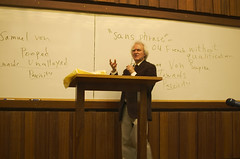I’ve just noticed that the Criminal Justice and Immigration Bill which got royal asset yesterday (btw, enthusiasts of necrophiliac porn, better hide it under the mattress[1]), contains provisions to make it an offence to incite hatred on grounds of sexual orientation. I am in general in favour of this, in the same qualified way in which I was in favour of the parallel provisions of the Racial and Religious Hatred Act 2006[2]. The reason being that the specific laws in question aren’t really particularly material restrictions on free speech (as with the 2006 Act, the current law on homophobia has an explicit clause explaining that merely critical or mocking speech is not incitement to hatred), and that the UK really doesn’t need any of the antisocial behaviour that is an inevitable consequence of incitements to hatred.
It does strike me, however, that two years ago, there was an awful lot of public protest against the RRHA06. Not the least of this came from comedians like Stephen Fry and Rowan Atkinson, who were making the point that mockery and criticism of religion were an important part of comedy and that they felt their right to free expression was under threat[3].
One doesn’t have to be an aficionado of Mr Humphries or Larry Grayson to be aware that British comedians have at least as much of a professional interest in the mockery of gays as they do in the mockery of religions, but if there was a big comedians’ protest against this one I missed it. In fact, I don’t recall the free speech lobby really raising much of a stir at all; Index on Censorship didn’t so much as mention it (Update: thanks Padraig Reidy in comments, they did mention it, once, last year), though they did take an interest in the religious hatred bill, and they are aware of the current Criminal Justice Bill.
This sort of thing is unfortunate; I’m sure nobody involved intended it this way[5], but to an outsider it would certainly look as if the 2006 kerfuffle had very little to do with freedom of speech, except in as much as it could be picked up as a handy stick to beat the Muslims with. And given that, I bet it looks that way to British Muslims too. Every time we try to have a sensible discussion of the subject of hate speech, it gets much more heated than it has any reason to be, and a lot of the reason for this, in my opinion, is that the free speech issue has got tangled up with a whole load of other questions about security and immigration, to nobody’s benefit.
[1] Also bestiality porn, and as far as I can see Plaid Cymru didn’t so much as raise an objection.
[2] In comments to that thread, my view of calls from the gay lobby for parallel protection was something along the lines of “tough luck”, because I didn’t think that violent homophobia was enough of a social problem to warrant a restriction on free speech. I now think this was a mistake, partly because when you put the point as bluntly as that it’s obviously callous, and partly because the overwhelming evidence of the experience of the 2006 Act is that the restriction on free speech is trivial.
[3] Ben Elton, the noted author, former comedian and disappointment[4], apparently still believes that jokes about Islam are too near the knuckle for the politically correct world of modern British comedy. He has perhaps not noticed that they more or less form Shazia Mirza or Omid Djalili‘s entire act. I suspect that what he means is that you’re not seeing white comedians making fun of Islamic minorities, in which case I rather think he owes an apology to Jim Davidson and the late Bernard Manning for more or less everything he said in the 80s.
[4] For example, as Alexei Sayle noted when Elton collaborated with Andrew Lloyd Webber on a musical: “It’s really quite tough, you know, when you see someone whose work you’ve been familiar with for years, you don’t agree with them on politics but you recognise that they’ve got a genuine talent – and then they go and write a musical with Ben Elton”.
[5] Not true, obviously; one of the Freedom of Speech marches that year very nearly had to be called off because of the amount of involvement from the BNP and similar groups. I’m referring to Rowan Atkinson and Stephen Fry here – I am sure their concern over free speech was sincere at the time.
